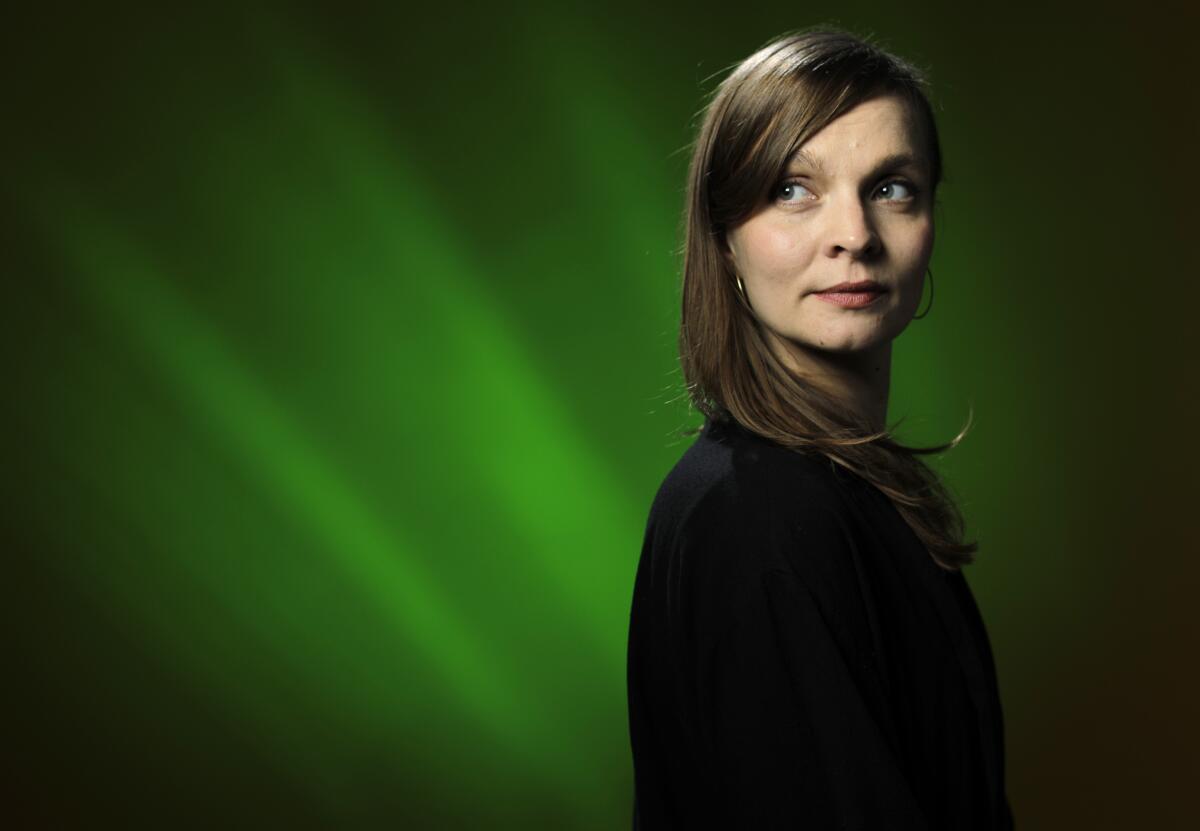How Hildur Guðnadottir’s music helps shape Arthur Fleck’s metamorphosis into Joker

One of the strongest scores of the year might also be the simplest — as well as the most integral to how the movie was made.
“Joker” was scored by Hildur Guðnadóttir, an Icelander who made her big Hollywood splash by musically embodying this famously devious clown as played by Joaquin Phoenix.
She has been making moody solo albums and scoring European films for years, and she performed cello on most of Jóhann Jóhannsson’s major scores (including “Arrival” and “Sicario”). The fellow Icelander, who died last year, was an old friend — and Guðnadóttir completed Jóhansson’s final score, for “Mary Magdalene,” and took up the “Sicario” mantel for the 2018 sequel.
Director Todd Phillips heard that score as he was looking for something “dark and heavy” for “Joker,” and reached out to Guðnadóttir. He also did something he’s never done before: sent a composer the script, and asked her to start writing music right away.
“When you’re making a film about one person,” Phillips said, “every other element really becomes a character in the film. The production design, the wardrobe — the way we shot the film, the city of Gotham. To me, the music is one of the biggest characters of the film.”
Guðnadóttir —who had just spent months staring at Phoenix as Jesus in “Mary Magdalene” — read the screenplay by Phillips and Scott Silver at home in Berlin, and found herself responding with deep empathy for the main character, Arthur Fleck.
“I thought it was really important to try to go into Arthur’s head, and try to make music from that place — what it meant to be Arthur, how Arthur felt,” she said. “And I really felt for him. He’s just a simple, beautiful human being.”
She went to her cello, the instrument she’s played since she was 5 years old, and expressed Arthur’s music — sad, beautiful, simple — in a startlingly visceral way.
“It was really like being punched in the chest when I found his notes,” she said. “I was like: That’s it! That’s what he’s trying to say.”
She sent Joker’s theme, along with a piece she called the “Defeated Clown” theme, to Phillips while he was shooting the film in New York.
“We would use that score on the set of the movie,” he said. “I had it playing in my headphones, the camera operator had it playing in his headphones, Joaquin would be hearing it. The sound guys wanted to kill me, but we’d be playing it over speakers during scenes. It really infected the set, in a good way, and it was just sort of in everybody’s bones.”
About three weeks into the shoot, Phillips and Phoenix were dissatisfied with the scripted version of a pivotal scene: After Arthur unleashes his dark side, killing three Wall Street bros on the subway, he runs into a grimy bathroom to hide his gun.
“We now had been shooting for a month, and it didn’t feel like the Arthur that we had been filming,” Phillips explained. “So we’re trying to figure out what to do on the day — we have 250 people outside, waiting to decide what we were going to shoot.”
Joker comes alive through dance in several places in the script, and they decided this would be a great moment for dance. Phoenix said: “But it’s not a happy dance. I don’t know what it is,” the actor recalled. Phillips said he had this new cello piece from the composer, and played it for Phoenix on his iPhone.
“And I was deeply moved by it,” said Phoenix. “It was mysterious, and there was this movement that felt — or at least I interpreted it as — kind of transformational.”
Phillips cranked up the theme on speakers, started the camera on the star’s shoe, and captured one of the most striking moments in the film: Arthur’s graceful, complicated metamorphosis into Joker.
“There was something that felt incredibly intimate and visceral about it,” said Phoenix. “And I think that probably really fueled me in a way.”
Phillips would send Guðnadóttir dailies from set, which would spark new music, and that music would then shape the film as it was being edited. They then went through the traditional scoring process with a cut of the film, trying and eventually rejecting several ideas — like musically commenting on the character of Sophie, played by Zazie Beetz, or Arthur’s relationship with his mother.
Guðnadóttir traced Arthur’s journey (his “ascent into madness,” in Phillips’ words) with the “Defeated Clown” theme. It’s another lonely, sympathetic idea for solo cello, but whispering almost silently behind it is a full 90-piece orchestra.
“Those are the kind of forces that are trying to push through,” she explained. “Those are the forces that he hasn’t really figured out yet. The last time we hear this theme is the most angry version of it — it has massive drums, and the whole orchestra’s just like suffocated the cello. It’s still there, but the anger has taken over Arthur.”
More to Read
Only good movies
Get the Indie Focus newsletter, Mark Olsen's weekly guide to the world of cinema.
You may occasionally receive promotional content from the Los Angeles Times.










